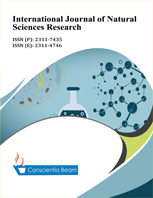Pathogenic Fungi Associated with Post-Harvest Deterioration of Cassava
DOI:
https://doi.org/10.18488/journal.63.2021.91.12.16Abstract
Cassava (Manihot esculenta) is a valued root crop grown throughout the tropics for food, feed, biofuel, and other industrial products. Nigeria is the largest producer of Cassava, and post-harvest deterioration of Cassava is one of the major challenges of long-term storage of cassava tubers. This study aimed to isolate and characterize pathogenic fungi implicated in the deterioration of cassava tubers, using samples from Iwo, Osun State, and Ijebu-Ode, Ogun State, Nigeria. The fungi genera isolated at the end of this study and their frequency of occurrence were Aspergillus (45.5%), Botryodioplodia (9.1%), Penicillium (18.2%), Rhizopus (18.2%), and P.sorghina (9.1%). A total of eleven fungi species were isolated and characterized in this study, seven of which were from the Ijebu- Ode Cassava samples and 4 fungi species from the Iwo samples. The pathogenicity test showed that Aspergillus nigricans (60mm) and P.sorghina (50mm) caused extensive deterioration of Cassava tuber. However, mild deterioration was observed from samples inoculated with Botryodiplodia (10mm) and Penicillium (14mm). This study has shown that a consortium of fungi species is implicated in the Post harvested deterioration of Cassava tubers.

